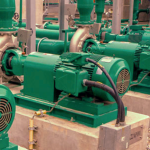**General Objective**
This training program aims to empower participants with knowledge, skills, attitudes, and understanding of how to develop the basic skills and knowledge of trainees through mechanisms to enhance environmental monitoring and inspection in factories, leading them to global levels and bridging the gap between current operating systems and the requirements of international laws and regulations. This is in accordance with the standards of the National Center for Environmental Compliance to support and enhance both the environment and public health. Pollution from industrial facilities has harmful effects not only on the environment but also on human health. Therefore, many measures that industrial facilities can implement to mitigate harmful environmental effects also simultaneously reduce the impacts that pose a danger to the health of facility workers, as well as residents in areas affected by emissions from these facilities.
**Training Methodology**
This training program involves a variety of interactive activities, group and individual exercises, case studies, and discussions, in addition to presenting the latest theories and thinking methods. The training environment will provide the necessary support to encourage individuals, regardless of their level of experience, to engage with the curricula they currently use, as well as experience new curricula introduced during this training program. The trainer will be prepared to answer any questions trainees may have and will play a supportive role in building and implementing new curricula. The goal behind this is to give trainees who attend this course a sense of the great value offered by this blend of learning styles and methods.
**Impact on the Organization/Company/Organization**
The attendance of employees in this training program will benefit the organization/company/organization in the following ways:
– Learning from examining the experiences of others’ successes.
– Providing practical examples of best practices and well-documented failures to maximize success opportunities in environmental inspection.
– Acquiring the skills and confidence to deal with environmental inspection and apply the best standards according to the National Center for Environmental Compliance.
**Impact on Trainees**
In this training program, your team members will learn and be provided with the opportunity to practice methods for:
– The scope of the National Center for Environmental Compliance regarding environmental compliance monitoring.
– Evaluating the key elements of environmental inspection among regulations, industrial policies, business interests, and sustainable development.
– The working method of environmental inspectors.
– Environmental auditing.
– Preparing the technical report for the environmental inspector.
– Cases of suspension or revocation of environmental compliance certificates.
– Standards for issuing environmental compliance certificates.
– Instances where individuals holding environmental compliance certificates are granted the right to use the compliance badge.
– Formulating strategies to improve and develop performance.
– Simulating work evolution and measuring impact.
– Mechanisms of environmental inspection work.
– Reviewing and establishing measures to assess the performance of inspectors and exclude those proven to be inefficient.
**Specific Objectives**
By the end of this training program, each trainee should be able to:
1. Understand the objectives of inspection.
2. Deepen the concept that environmental inspection does not mean imposing penalties on industrial facilities.
3. Achieve the effectiveness of the inspection process on industrial facilities that lead to:
– Protecting the environment.
– Protecting workers in industrial facilities.
– Protecting public health.
4. Understand inspection activities.
5. Understand the tasks of environmental inspection.
6. Understand the areas and specialties of environmental inspectors.
7. Understand the responsibility of inspection management towards corrective actions.
8. Understand inspection activities during inspection tours of the National Center for Environmental Compliance.
9. Inspect environmental incidents subject to reports and complaints.
10. Conduct environmental inspections and verify compliance with occupational health and safety standards, ensuring the preservation and enhancement of worker welfare, and mitigating risks and their sources.
11. Investigate complaints, identify root causes and resulting impacts, and identify necessary measures to avoid recurrence in the future.
12. Recommend corrective measures to improve compliance with standards and regulations, and improve occupational health and safety.
13. Apply penalties such as fines and license revocation in cases of non-compliance.
14. Increase awareness of environmental protection regulations and educate the public on environmental protection methods.
15. Understand the responsibilities and stages of the field inspection process for factories.
**Program Topics**
First Training Day:
– Pre-test to determine the trainees’ level before starting the training program.
– Introduction to the training program: Environmental Inspection.
– Objectives of environmental inspection and responsibilities of environmental inspectors.
– Environmental inspection activities.
– Environmental performance plan, emergency plan, and environmental status record.
– Compliance obligations.
– Control of solid, liquid, and hazardous materials and waste.
– Conservation of resources and energy.
– General appearance of industrial facilities and their equipment.
– Role of the environmental officer and the commitment of industrial facilities.
– Environmental measurements.
– Cases of environmental non-compliance.
– Preparation of the environmental inspection report.
– Specialties of environmental inspectors.
– Tasks of environmental inspection management according to the standards of the National Center for Environmental Compliance.
– Administrative control actions.
– Judicial control actions.
– Required capabilities in the industrial facility inspection team.
Second Training Day:
Policies, Procedures, and Planning:
– Policies adopted by the National Center for Environmental Compliance.
– Encouraging voluntary compliance by the facility.
– Coordination between inspection bodies.
– Following the principle of announced and surprise inspection.
– Management responsibility towards corrective actions.
– Respect for the rights of the facility.
– Planning environmental inspection operations and implementing them to determine the extent of compliance with the standards and regulations set by the National Center for Environmental Compliance.
– Environmental status of industrial facilities in the Kingdom.
– Prioritization standards of the plan.
– Determining financial resources.
– Determining human resources and capacity building.
– Submitting constructive proposals to review environmental legislation issued by the National Center for Environmental Compliance.
– Assessing the efficiency of management performance.
Third Training Day:
Inspection Activities:
– Comprehensive periodic (multi-environment) inspection.
– Qualitative inspection.
– Follow-up inspection of violating facilities.
– Inspection of environmental incidents subject to reports and complaints.
– Inspection campaigns.
– Compliance and follow-up procedures.
– Cases of facilities violating for the first time.
– In case of repeated violations.
– Follow-up procedures.
– Developing environmental inspection and auditing.
– Preparation and implementation of annual environmental inspection plans.
– Inspection, monitoring, violation control, and coordination with the Ministry of Interior when necessary regarding violation control operations.
– Delegating specialized private sector companies for administrative inspection tasks and using them in technical inspections under the supervision of the center’s inspectors.
– Receiving and reviewing self-control reports of individuals and ensuring environmental compliance and the effectiveness of approved self-control programs.
– Establishing conditions and controls related to environmental audit studies.
– Receiving and reviewing environmental audit study reports and issuing relevant decisions.
– Monitoring individuals’ compliance with the implementation of self-control reports and environmental audit study reports and action plans for corrective measures.
– Issuing environmental compliance certificates.
– Coordinating with other national environmental centers when necessary regarding inspection operations, and whenever reports and plans submitted are related to the jurisdictions or authorities of these centers.
Fourth Training Day:
The Three Stages of the Field Inspection Process for Industrial Facilities:
– Stage One: Pre-field inspection stage.
– Stage Two: Field inspection stage.
– Stage Three: Post-field inspection stage.
Types of Field Inspection for Industrial Facilities:
– First Type: Inspection with relevant authorities.
– Second Type: Periodic inspection.
– Third Type: Inspection to verify the accuracy of reports and data.
– Fourth Type: Inspection upon receiving environmental complaints or reports.
– Fifth Type: Inspection in emergency situations.
Fifth Training Day:
Responsibilities of the Field Inspection Process for Industrial Facilities:
– Responsibilities of the pre-field inspection stage.
1. Management responsibility.
2. Team leader and inspectors’ responsibilities.
– Responsibilities of the field inspection stage.
1. Management responsibility.
2. Team leader and inspectors’ responsibilities.
– Post-field inspection stage.
1. Management responsibility.
2. Team leader’s responsibilities.
3. Inspectors’ responsibilities.
– Post-program assessment to determine the trainees’ level after the training program.
– Distribution of attendance certificates to trainees.
– Taking photos and a group picture of the training program.
**Training Requirements and Tools**
– Devices and equipment: Device connected to the internet and Zoom program.
– Training exercise materials: Comprehensive training kit for trainees.
– Others: Trainee guide for the training program, and a worksheet for the training program.
**Target Audience**
This training program targets:
– Environmental managers and officers.
– Environmental auditors.
– Environmental inspectors.
– All individuals working in the field of environmental monitoring and inspection of industrial facilities.
– All employees and managers entrusted with the tasks of environmental protection, inspection, and monitoring.
– Those who may participate in committees or are tasked with monitoring and protecting the environment.






